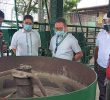Davao-based entrepreneurs are eyeing medical transcription as another potential industry to generate much-needed jobs. If only they can surmount the challenge posed by voice-recognition softeware.
�
By Germelina A. Lacorte
davaotoday.com
DAVAO CITY — Will medical transcription give hope to the country�s jobless? Yes, according to two entrepreneurs trying to attract students to enroll in a course on medical transcription here.
Defined as a process of typing out on a computer what a doctor dictates to a recorder, medical transcription is considered the second wave of job outsourcing available in the country after the call-center industry, according to officials of the Department of Trade and Industry (DTI).
Medical transcribers are those who make reports on medical records and treatment history of patients, among others. But while projections for the industry is bright, the jobs that future medical transcribers are eyeing may soon be replaced by software that are being developed and perfected by US companies now.
In an investment clinic inside the DTI office here, Lizabele Holganza, who runs the country�s first medical transcription program approved by the Technical Education Skills Development Authority (Tesda), and Shielamae Pe, operations manager of SSP Transcriptions, said it�s high time for the country to take advantage of the dollar-earning potential of this booming industry by attracting small and medium entrepreneurs to engage in the business.
Medical transcription is now a $20 billion industry in the US, with global demand for medical transcribers reaching an estimated 49,000 to 130,000 each year, according to MTC�s brochures distributed during the forum.
This huge global market is jacking up demand for medical transcribers in English-speaking countries like the Philippines, said Holganza. �The demand is so high that medical transcriptionists rarely look for work. Work finds them,� MTC said.
Pe said she is trying to invest in this fast-growing industry in the provinces to allow Filipinos to get a job without going out of the country.� She also tried to downplay the threat posed by voice recognition software, now the subject of intensive researches in US universities that might potentially replace most of transcribers� job in the future.
Voice recognition software allows one to dictate anything on the computer which will transcribe and process the data into a report. But although some of these software are now available in the market, there is still a margin of error that need to be corrected after the computer transcription, she said.
�It holds promise, but we�re not there yet,� Pe told prospective medical transcription entrepreneurs and students during the investment clinic inside the Department of Trade and Industry (DTI) office here.� �It will take time for this kind of technology to develop. It�s not going to happen that fast and even if it does, there is still that need to customize the software to recognize different speech patterns of people who are going to use it.�
The software is supposed to be a cost-saving technology because it will make medical transcription companies rely less on a huge workforce of medical transcribers. This link, http://www.voicerecognition.com/, for instance, advertise an unprecedented accuracy rate of� 99 percent for its voice recognition software, promising its buyer to save time, say goodbye to transcription fee.
Both Pe and Holganza are urging small and medium entrepreneurs to go into the medical transcription business to generate more jobs for the economy.
The MTC brochure trying to entice students to enroll on medical transcription course said that estimated income for MT staff based in the Philippines alone can range as high as 18,000 pesos a month while home-based ones can go as high as 75,000 pesos a month and a low of 25,000 pesos a month. US-based staffs can earn a high of $40,000 a year or $30 per hour and a low of $25,000 a year or $8 an hour.
After a one-year experience in a medical transcription job, a medical transcriber can learn enough to go home-based, according to MTC.
Pe said that the salaries she is giving to her medical transcribers are way above the minimum wage and even higher than what private school teachers in Davao have been receiving. She said the salary range in Davao is way below those in Metro Manila because of the difference in the cost of living in the two areas.
Pe said it�s not only medical transcription but also legal and other types of transcriptions that are experiencing a boom in the US market.
To generate more discussions on the medical transcription business, DTI has slated another forum on �Medical Transcription: Its Business Prospects�� to tackle the industry as a whole, the requirements in setting up an MT business, the MT learning systems and possible financial support. (Germelina A. Lacorte/davaotoday.com)










